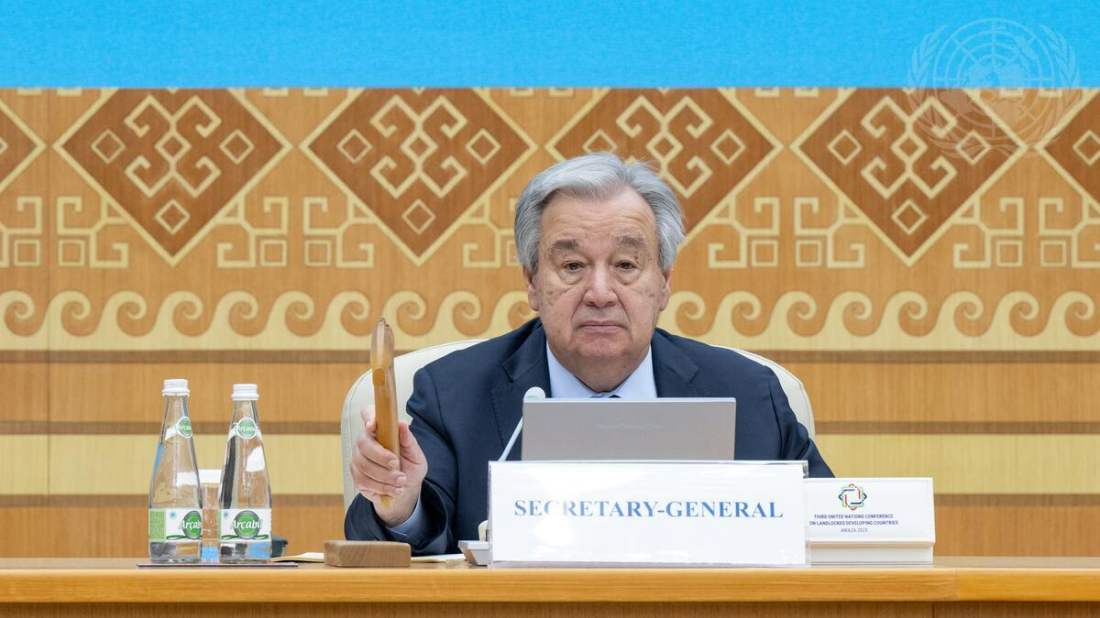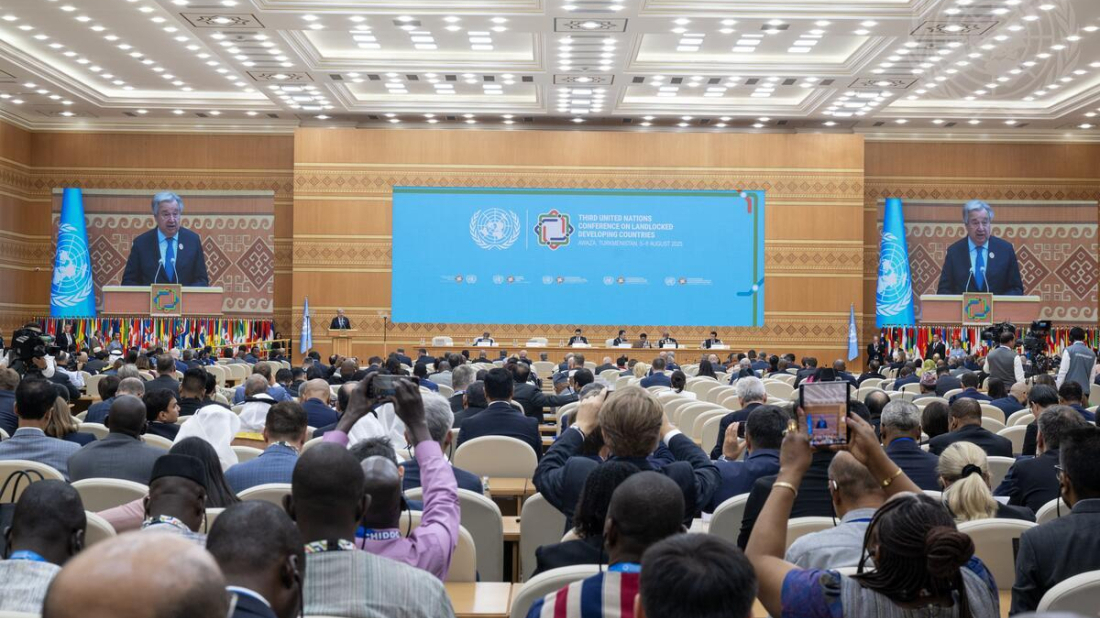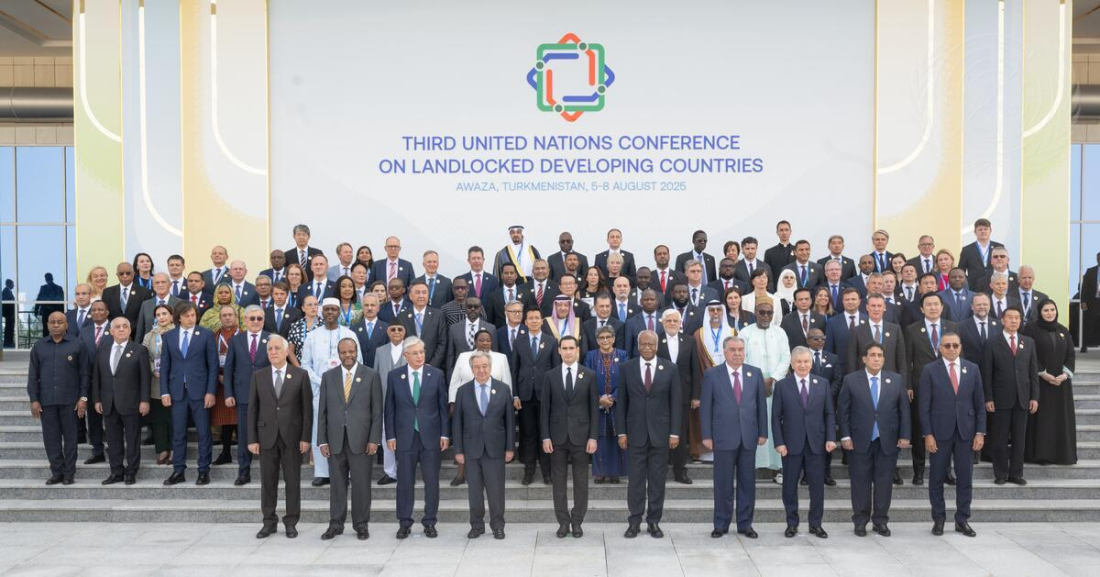Turkmenistan plans Brussels visit as EU revives long-stalled partnership deal
Turkmenistan is preparing for a presidential visit to Brussels as the European Parliament considers ratifying a partnership agreement that has been st...

Today, 6th August, marks the inaugural celebration of the International Day of Awareness of the Special Development Needs and Challenges of Landlocked Developing Countries, whose geographic disadvantage hinders their ability to diversify economies, compete effectively, and join global market.
The United Nations General Assembly recently adopted a resolution to observe this day globally, placing the unique needs of these countries high on the international agenda.
Speaking at the Third UN Conference on Landlocked Developing Countries on Tuesday (5th August), the UN Secretary-General António Guterres urged global leaders to rethink development for landlocked nations that continue to face the “daunting challenges” - steep barriers to trade, high transport costs, and limited access to global markets. He warned that the debt burden of these countries has reached “dangerous and unsustainable levels.”
"This conference must send a clear message: that geography does not determine destiny. It is not the fault of those landlocked countries that they do not have access to the sea," he stated. "The international community must make sure that such countries have access to opportunities, prosperity, hope and dreams and unlimited imaginations."

He stated that the General Assembly would continue to serve as the global platform to support landlocked developing countries (LLDCs).
The General Assembly will support this effort through annual monitoring of the Awaza Programme of Action, a high-level midterm review scheduled for 2029, and a strong commitment to dialogue and cooperation—first among landlocked and transit countries, second within the United Nations system, and third with all relevant stakeholders.
UN Secretary-General Guterres calls for action:
Economic Diversification and Digital Transformation:
- Invest in value-added industries, local innovation, and inclusive growth
- Bridge the digital divide to unlock AI, e-commerce, and smart logistics
Trade, Transit and Regional Connectivity:
- Upgrade infrastructure and simplify cross-border procedures
- Integrate LLDCs into global value chains and reform trade systems
Climate Action and Resilience:
- Double adaptation finance and build climate-resilient infrastructure
- Support LLDCs in green transitions with technology and partnerships
Financing and Partnerships:
- Reform global financial systems to ensure fair, accessible funding
- Scale concessional finance and unlock climate investment at speed

Of the total 32 landlocked developing countries in the world, 16 are in Africa, 10 are in Asia, 4 are in Europe, and 2 are in Latin America. LLDCs are home to over 570 million people, representing about 7% of the global population.
The smallest LLDC is Bhutan (less than one million people) and the largest is Ethiopia (135 million people).
The average distance of LLDCs to a seaport is 1370 km. Kazakhstan is located farthest from the sea (3750 km) followed by Afghanistan, Chad, Niger, Zambia, and Zimbabwe with distances from the nearest sea coast in excess of 2,000 km.
According to the United Nations Development Programme, half of all landlocked developing countries (LLDCs) are classified as least developed countries, facing vulnerabilities ranging from geographic isolation to structural economic weaknesses.
It says that many of the landloacked countries are mountainous countries, suffering from melting glaciers, water shortages, frequent landslides and reduced biodiversity, among other things. An estimated 54% of LLDCs’ land is classified as drylands, disproportionately affected by desertification, land degradation and drought.
Eleven of the 32 have lack access to affordable and clean energy. A half of population in the landlocked countries live with limited or no electricity. Many of these countries have electrification rates below 50%, with some below 27% for access to clean cooking.
Only 35% of people living in LLDCs can access the internet, significantly below the world average of 66%. While 95% of the population is covered by mobile networks, less than half of the population has access to 4G, which is crucial for digital trade.
Cuba’s fuel crisis has turned into a waste crisis, with rubbish piling up on most street corners in Havana as many collection trucks lack enough petrol to operate.
Iran’s Revolutionary Guards navy held military exercises in the Strait of Hormuz on Monday (16 February), state-linked media reported. The drill took place a day before renewed nuclear negotiations between Tehran and Washington in Geneva.
Ruben Vardanyan has been sentenced to 20 years in prison by the Baku Military Court after being found guilty of a series of offences including war crimes, terrorism and crimes against humanity.
Canadian Prime Minister, Mark Carney, announced on 16 February that the Honourable Janice Charette has been appointed as the next Chief Trade Negotiator to the United States. She's been tasked with overseeing the upcoming review of the Canada-United States-Mexico Agreement (CUSMA).
The Pentagon has threatened to designate artificial intelligence firm Anthropic as a “supply chain risk” amid a dispute over the military use of its Claude AI model, according to a report published Monday.
Millions of Muslims around the world have begun observing Ramadan, the ninth month of the Islamic lunar calendar and the most sacred period in Islam.
Qarabağ FK will face Newcastle United in the UEFA Champions League play-off round on Wednesday evening in Baku, in what will be the first UEFA competition meeting between the two clubs.
Meta Chief Executive Mark Zuckerberg is expected to testify in a high-profile trial in Los Angeles examining claims that the company’s platforms contributed to youth addiction and mental health harm.
The drumbeats have finally faded at the Marquês de Sapucaí, bringing the competitive phase of the Rio Carnival 2026 to a dazzling close. Over two marathon nights of spectacle, the twelve elite schools of the "Special Group" transformed the Sambadrome into a riot of colour.
Japan’s parliament has reappointed Sanae Takaichi as the country’s 105th prime minister ten days after a snap general election that handed her party a decisive two-thirds majority in the lower house.
You can download the AnewZ application from Play Store and the App Store.

What is your opinion on this topic?
Leave the first comment